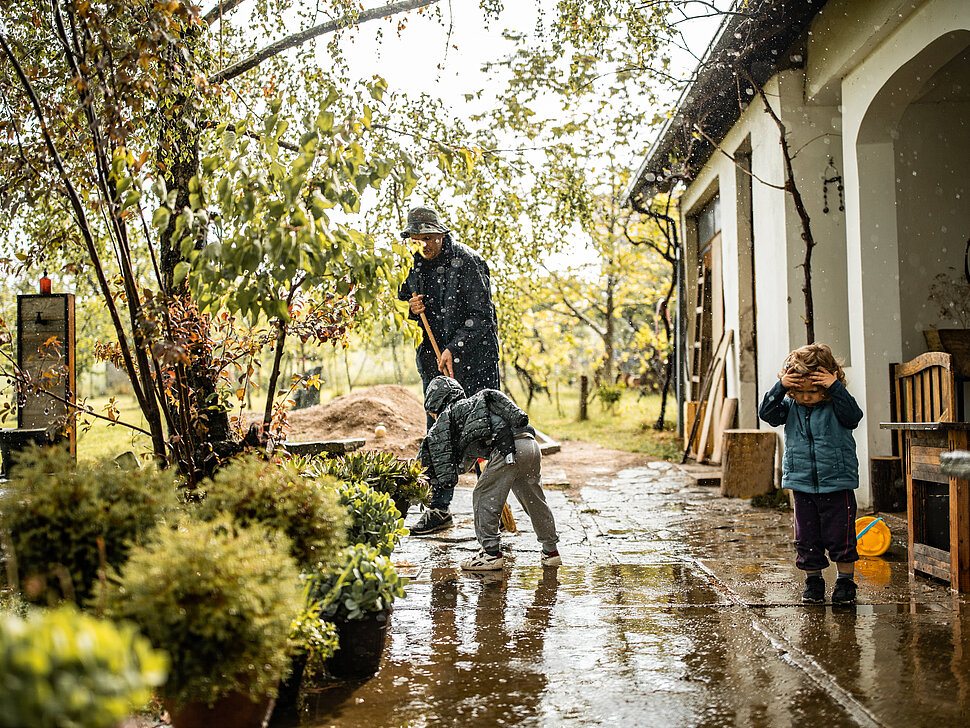Reading time: 7 min
Acting in Times of Crisis: Getting Help – and Helping Others Too
The current energy crunch is not the first event to demonstrate how vital it is to be informed and prepared for an emergency. But whatever happens, you’re not alone. Here’s how to get help – and how you can help others too.
Empty shelves in supermarkets, lines of trucks back for miles at border checkpoints, curfews, and overflowing intensive care units – would you have believed such things possible? Yet it all happened in Germany from March 2020, following the onset of the coronavirus pandemic.
COVID-19 brought home to all of us, how vulnerable our infrastructure is and that the security and safety we had enjoyed so freely cannot be taken for granted. However, the pandemic also demonstrated how we can get through a crisis – above all, by showing solidarity and helping each other. The federal government, the states, and towns and cities provide support where they can. But when things get serious, it always comes down to how much individuals are prepared to help one another.
Be Prepared – for Any Eventuality
The best kind of help is helping yourself. The coronavirus pandemic reminded us how important emergency supplies can be. The German Federal Office of Civil Protection and Disaster Assistance recommends building a stockpile of food and drink to last ten days. Two liters of liquid and 2,200 kcal per person per day should be the minimum. You can view the checklist here.
Remember to make sure you have candles, flashlights, and spare batteries, too, since we could possibly see some power outages this coming winter as a result of the energy crunch or overloaded networks. It’s also a good idea to have your most important documents ready to hand, and to stock up at home on all the medications you might require.
Even once we’ve gotten through this winter, self-reliance will still be an important issue. In recent years, it’s become clear that occurrences such as heavy rain, flooding, and forest fires are becoming more frequent and more severe.
How Can I Get Help in an Emergency?
We all know about calling 110 or 112. However, something like a power or gas outage doesn’t justify calling an emergency number. These really are only for acute emergency situations. In the event of a disaster, the NINA and KATWARN warn apps will alert you automatically, as will the sirens.
Rescue services, hospitals, and the police and fire department are equipped to keep working and helping even during a prolonged crisis. And towns and municipalities in the Ruhr valley are currently planning centralized meeting points for major crisis situations – places where people can be supplied with necessities like medical supplies or drinking water, along with information about the situation. However, you should only use such meeting points if your own supplies are exhausted, or in the event of a medical emergency.
If there is no medical emergency, you can still seek assistance from local welfare organizations such as Caritas, the Worker’s Welfare Association (AWO), or the Diakonie social services organization. These bodies will always offer help to those in need, along with a great deal of understanding for those times when you just don’t feel able to manage alone.
You can also get information from the social media networks. Facebook groups like “Waltrop hilft” (Waltrop Helps) – a group set up during the pandemic – allow neighbors to support each other quickly and efficiently. Here, in addition to getting help yourself, you can also help others. Many Ruhr valley towns now have Facebook groups like this.
How Can I Help?
Even if you and your family are well prepared for any eventuality, your neighbor might not be. If you notice that someone needs help, be they neighbors, friends, relatives, or strangers, please support them. Be proactive in offering help. Simply coming by with a blanket you don’t need can sometimes be enough.
During the 2021 flood disaster, we all saw how vital it is for each individual to help out and get involved. But it’s also important to avoid putting yourself in serious danger while trying to help others. The police and rescue services are trained for such situations and know what needs to be done.
If you have supplies you don’t need, donate them. Food is good, but so are medications, clothing, and blankets. Welfare and aid organizations like the German Red Cross can make sure your donations get to the right people. And if you come across someone who needs first aid, administer it.
In the wake of natural disasters like floods or heavy storms, there’s a lot of cleaning up to do. Every helping hand is welcome, so don’t hesitate to pitch in.
As the former German Chancellor Helmut Schmidt once said:
“Character comes out in a crisis. ”
If you’re well stocked and well prepared, you’ll be in a position to help others as well as getting through a major crisis yourself. Although the federal government, the states, and towns and cities will always ensure that infrastructures are maintained as effectively as possible, each of us can provide important help in a disaster situation.


